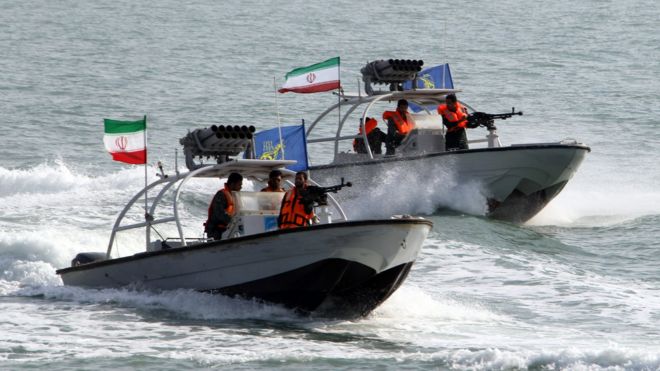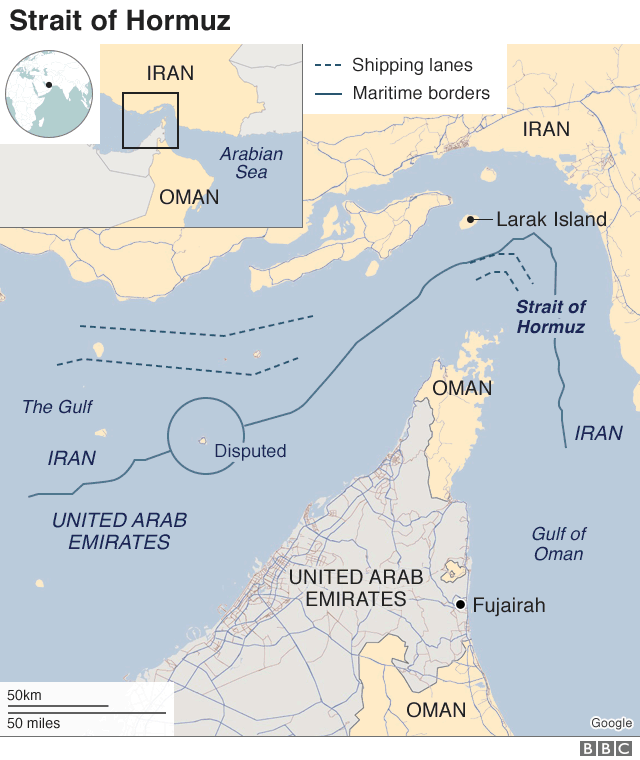
The Revolutionary Guards' naval force is tasked with patrolling the Strait of Hormuz
Iran says it seized a "foreign tanker" and its 12 crew on Sunday for smuggling fuel in the Gulf.
State television quoted Iran's Revolutionary Guards as saying the ship had been smuggling one million litres (220,000 gallons) of fuel.
It is not yet confirmed if it is the UAE-based Riah tanker that stopped transmitting its position as it sailed through the Strait of Hormuz on Sunday.
Iran said earlier this week it had come to the aid of a broken-down tanker.
Without naming the Riah, Iran said it had towed the foreign tanker into Iranian waters for repairs after "receiving a request for assistance" on Sunday. It made no mention of seizing the ship.
The Revolutionary Guards' Sepah News site said on Thursday that the alleged fuel-smuggling ship was seized on Sunday during naval patrols aimed at "discovering and confronting organised smuggling".
The ship had a two million-litre capacity, but was carrying one million litres of fuel when it was seized south of Iran's Larak Island, the website said.
The ship and crew were caught "trying to hand over smuggled fuel which it had received from Iranian dhows to foreign ships further afield", it went on. The case is now "going through judicial procedures".
The UK government said it was seeking further information over the reports and urged the Iranian authorities to "de-escalate the situation in the region".


Tensions have been high in the Gulf since the US tightened the sanctions that it reimposed on Iran's oil sector after unilaterally withdrawing from a landmark 2015 nuclear deal.
The US has blamed Iran for two separate attacks on oil tankers in the Gulf of Oman in May and June - an allegation Tehran has denied.
Iran also shot down a US surveillance drone over the Strait of Hormuz in disputed circumstances.
UK warships have meanwhile been shadowing British oil tankers in the area since Iran threatened to seize one in response to the impounding of an Iranian tanker off Gibraltar.
The UK said the tanker was suspected of breaching EU sanctions against Syria. Iran denied it was en route there.
US Central Command Chief General Kenneth McKenzie, speaking on a visit to Saudi Arabia on Thursday, said he was working "aggressively" to find a solution to free passage for ships through the Gulf region, Reuters news agency reports.


The situation of missing or impounded tankers in the congested waters of the southern Gulf is far from clear.
Commercial vessels navigating the Gulf, the Strait of Hormuz and the high seas are all normally equipped with a transponder known as AIS (Automatic Identification System).
This transmits their location on two dedicated VHF (Very High Frequency) channels.
When it is switched off, the ship's signal disappears from the satellite map, making it difficult, as in this case, to work out where a ship has gone to and what it is up to.
What is beyond doubt is that illegal smuggling has been going on for decades in the Gulf, including by oil tanker captains hugging the Iranian coastline to stay out of international waters, allegedly bribing local coastguards along the way.
For years a fleet of fast Iranian speedboats has plied the short distance between the Omani port of Khasab and Iranian ports close to Bandar Abbas, evading coastguard patrols and smuggling cigarettes and other lucrative contraband.
Source: BBCNews

No comments:
Post a Comment
Add a Comment...